|
|
|
Sort Order |
|
|
|
Items / Page
|
|
|
|
|
|
|
| Srl | Item |
| 1 |
ID:
182945
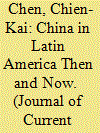

|
|
|
|
|
| Summary/Abstract |
Examining China’s policy towards Latin America from 1949 to the present day, this article uncovers a puzzle about China in Latin America: while the guiding doctrine of China’s policy towards the region has never changed (i.e. “South–South Cooperation” on the basis of the “Five Principles of Peaceful Coexistence”), there is a difference in terms of its policy goal between then and now (i.e. a very revisionist and politically focused goal until the late 1970s as compared to a less revisionist and economically focused one today). Based on the theory of systemic constructivism, this article demonstrates that the change of the interactions between China and other countries in our world (from isolation and confrontation to engagement and interdependence) has changed China’s perception about the nature of the international system, as well as its identity and interests in the system, which in turn has changed its policy goal towards Latin America and the “Global South” in general.
|
|
|
|
|
|
|
|
|
|
|
|
|
|
|
|
| 2 |
ID:
180005
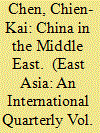

|
|
|
|
|
| Summary/Abstract |
There is an ongoing debate about whether China’s growing economic presence in the Middle East will eventually make it more politically assertive on the Middle Eastern affairs. This paper demonstrates, from a theoretical perspective of “path dependence,” that China’s promotion of the “Five Principles of Peaceful Coexistence” since the 1950s as the guiding doctrine of its foreign relations has forged a “path” for China to follow, along which it has made and repeated promises against interventionism and imperialism to other countries including the Middle Eastern ones. It, in turn, has created a situation where moving away from that “path against interventionism and imperialism” will cause huge damage to China’s reputation as a reliable non-interventionist partner to the Middle Eastern countries, and the “Global South” in general. As a result, China has refrained, and will arguably continue to refrain, from being too politically assertive on the Middle Eastern affairs.
|
|
|
|
|
|
|
|
|
|
|
|
|
|
|
|
| 3 |
ID:
180679
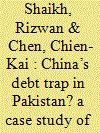

|
|
|
|
|
| Summary/Abstract |
Existing literature on China–Pakistan trade relations mainly deals with potential opportunities for Chinese investment, while no study has so far specifically analysed Chinese investment in light of the China–Pakistan Economic Corridor (CPEC) project by taking into account how Pakistan’s domestic factors shape foreign trade relations. This article argues that the weak economic indicators of Pakistan reveal a possibility of defaulting on debt repayments, as Chinese loans have relatively high-interest rates. Through a two-level analytical framework, this article demonstrates that, despite concerns about Chinese debt traps at the international level, the CPEC project is still largely intact due to strong domestic support of the Pakistani establishment. Further, the geostrategic importance of Pakistan for China is higher than merely trade relations. It is thus also not in the interest of China to see its investments in Pakistan become a debt trap, though the institutional arrangements in Pakistan are prone to mounting debts.
|
|
|
|
|
|
|
|
|
|
|
|
|
|
|
|
| 4 |
ID:
134182


|
|
|
|
|
| Publication |
2014.
|
| Summary/Abstract |
China-Taiwan Relations have become significantly less confrontational since 2008. One of the indicators demonstrating the improvement of their relations is the resumption of the contact between China's Association for Relations Across the Taiwan Straits (ARATS) and Taiwan's Straits Exchange Foundation (SEF) in 2008 after 9 years of no formal interaction. The purpose of this paper is to explore China-Taiwan relations in the period from 1990 to 2008 by examining the interaction between the aforementioned two organizations which were founded in 1991. By analyzing the relevant official announcements and statements made by China and Taiwan in the period from 1990 to 2008, this paper finds that China became more hostile toward Taiwan and therefore its ARATS in turn was unwilling to negotiate with Taiwan's SEF when it perceived that the Taiwanese government was pushing for Taiwan's independence. By contrast, when it perceived that the Taiwanese government was more compromising on the issue of Taiwan's independence, it became relatively conciliatory and its ARATS in turn was more willing to interact with Taiwan's SEF.
|
|
|
|
|
|
|
|
|
|
|
|
|
|
|
|
| 5 |
ID:
114798
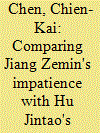

|
|
|
|
|
| Publication |
2012.
|
| Summary/Abstract |
Although the essence of China's Taiwan policy has not changed from the era of Jiang Zemin to the present, the era of Hu Jintao, Jiang's and Hu's attitudes are different. Jiang was impatient with the delay in the unification of China and Taiwan, talking about timetables for unification; however, Hu has so far been patient, saying that he is not afraid of delaying unification. The purpose of this paper is to explain why their attitudes are different. I argue that two factors combine to result in Jiang's impatience and Hu's patience: conflicting 'perceptions of Taiwan's domestic politics and Taiwan's China policy' and differing 'perceptions of the US behavior and attitude regarding Taiwan'.
|
|
|
|
|
|
|
|
|
|
|
|
|
|
|
|
| 6 |
ID:
153684


|
|
|
|
|
| Summary/Abstract |
Regime type—from authoritarian to democratic—is an important factor in determining the politics of aging and can explain why Singapore has embraced a “Confucian welfare state” model that emphasizes society’s responsibility, while Taiwan has gone from a similar system to a social welfare state more reminiscent of European countries.
|
|
|
|
|
|
|
|
|
|
|
|
|
|
|
|
| 7 |
ID:
105211
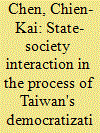

|
|
|
|
|
| Publication |
2011.
|
| Summary/Abstract |
This paper examining the process of Taiwan's democratization introduces a special mode of democratization which involves cooperative interactions between reformists in the state and oppositionists in society. Focusing on the years 1990 to 1992, a key period of Taiwan's democratization during which key authoritarianism-supporting institutions were destroyed, the paper demonstrates that a tacit coalition of the reformists in the state and the oppositionists in society began to loom in Taiwan in July 1988 and was solidified in June 1990, and, from June 1990 to December 1992, this coalition successfully forced the conservatives in the state to accept its demand that key authoritarianism-supporting institutions had to be destroyed.
|
|
|
|
|
|
|
|
|
|
|
|
|
|
|
|
|
|
|
|
|